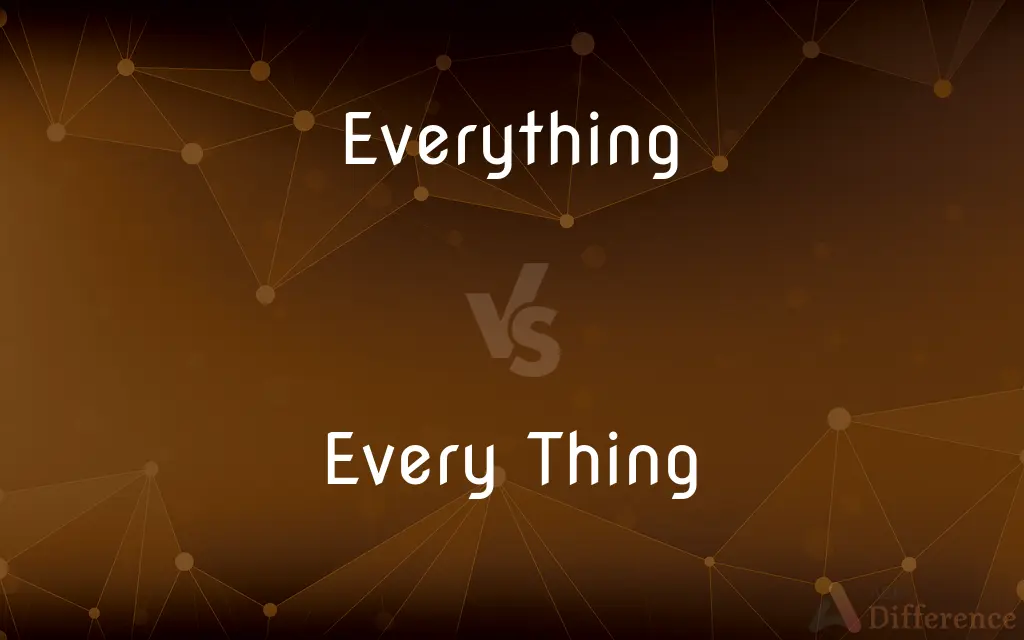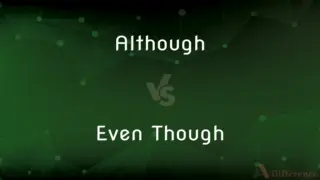Everything vs. Every Thing — What's the Difference?
By Tayyaba Rehman — Published on November 3, 2023
"Everything" is a pronoun meaning all things collectively, while "Every Thing" emphasizes each individual item or element.

Difference Between Everything and Every Thing
Table of Contents
ADVERTISEMENT
Key Differences
"Everything" is a single word that functions as a pronoun in the English language. It is a holistic term, denoting the entirety or totality of things, without focusing on individual elements. For example, saying "Everything is ready" indicates a collective readiness. In contrast, "Every Thing" comprises two words: "every" (an adjective) and "thing" (a noun). This distinction emphasizes individuality among the elements or items being referred to.
The nuance between "Everything" and "Every Thing" can be better understood contextually. In a situation where someone mentions, "Everything is on the table," it conveys that all the required items, collectively, are on the table. However, if one says, "Every Thing is on the table," the emphasis shifts to each specific item, implying individual acknowledgment of all items.
Grammatically speaking, "Everything" is often used when the focus isn't on distinguishing each item but rather on indicating a complete set or the whole. "Every Thing," on the other hand, serves to underline and highlight every single entity or item in a group, stressing their individual presence.
In casual conversations, "Everything" is more commonly used because of its broad and all-encompassing nature. "Every Thing" is less frequently employed, but when it is, it's typically in scenarios requiring clarity or emphasis on individual components rather than the group as a whole.
Comparison Chart
Word Count
Single word
Two words
ADVERTISEMENT
Function
Pronoun
Adjective + Noun
Implication
Holistic, collective
Individual, specific
Use in Sentence
Broad, general context
Emphasizing individual items
Commonality
More commonly used
Less common, used for specificity
Compare with Definitions
Everything
All relevant matters.
She told him everything about her past.
Every Thing
Each individual item in a set or collection.
Every thing in this box is labeled.
Everything
The most important aspect or part.
Trust is everything in a relationship.
Every Thing
All entities considered individually.
Every thing you own has a story.
Everything
The entirety of a particular set of items or ideas.
Everything in this room belongs to me.
Every Thing
Every distinct element in a scenario or situation.
Every thing was in its rightful place.
Everything
All that exists.
Everything in the universe is vast and mysterious.
Every Thing
Every single aspect or part of something.
He examined every thing to ensure quality.
Everything
(literally) All the things under discussion.
I checked the list again and everything is done.
Thank you for everything you've done for us.
Every Thing
All items or components, individually acknowledged.
She appreciated every thing he did for her.
Everything
Many or most things.
I did everything today - washed the dishes, cut the lawn, did the laundry.
Everything
(colloquial) A state of well-being (from all parts of the whole).
She wasn't feeling well this morning but now everything is fine.
Since the company lost its best customer everything has gotten worse.
Everything
(colloquial) Considerable effort.
It took everything in me to resist the temptation to skip work on my birthday.
Everything
(colloquial) The most important thing.
I can't believe I made it in time - timing is everything!
Everything
Whatever pertains to the subject under consideration; all things.
More wise, more learned, more just, more everything.
Everything
All available or applicable things.
Everything in the store is on sale.
Common Curiosities
Can "Every Thing" and "Everything" be used interchangeably?
Not always; "Everything" is collective, while "Every Thing" emphasizes individual items.
In which situations is "Every Thing" more appropriate?
When you want to emphasize or acknowledge each individual item or element.
Is "Everything" a noun?
No, "Everything" functions as a pronoun.
How does "Everything" relate to other pronouns?
"Everything" is related to pronouns like "everyone" and "everywhere" in that they collectively refer to all in a set.
Does "Every Thing" highlight individuality?
Yes, "Every Thing" stresses each specific entity or item.
Can "Every Thing" be used in formal writing?
Yes, when emphasizing specificity or individual elements.
Is "Every Thing" grammatically correct?
Yes, "Every Thing" is grammatically correct but has a different nuance from "Everything."
Do "Everything" and "Every Thing" have different origins?
Both stem from Old English but have evolved in usage over time.
Is "Everything" one word or two?
"Everything" is a single word.
Can the distinction between the two affect comprehension?
Yes, the choice between them can influence the nuance or emphasis of a sentence.
Which is more common in daily usage?
"Everything" is more commonly used in daily language.
Can I say "Everything is in the box" and "Every Thing is in the box"?
Yes, but the former suggests all items are in the box, while the latter emphasizes each individual item.
Is "Everything" used in idioms?
Yes, for instance, "Everything under the sun."
Are there synonyms for "Everything"?
Yes, words like "all," "entirety," and "whole" can be synonyms, depending on context.
Is "Every Thing" often used in writing?
It's less common than "Everything" but used when stressing individual items.
Share Your Discovery

Previous Comparison
Although vs. Even ThoughNext Comparison
Silicon Diode vs. Germanium DiodeAuthor Spotlight
Written by
Tayyaba RehmanTayyaba Rehman is a distinguished writer, currently serving as a primary contributor to askdifference.com. As a researcher in semantics and etymology, Tayyaba's passion for the complexity of languages and their distinctions has found a perfect home on the platform. Tayyaba delves into the intricacies of language, distinguishing between commonly confused words and phrases, thereby providing clarity for readers worldwide.
















































